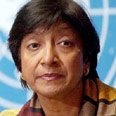
UN rights chief appeals for anti-racism conference
Commissioner Navi Pillay tires to assure skeptics that nature of upcoming UN conference on racism will not turn anti-Semitic; calls criticism of meet unwarranted
The UN Rights chief on Monday rejected fears that an upcoming UN conference on racism might turn into an anti-Semitic diatribe and urged countries to make the meeting a success by focusing on global issues.
The conference scheduled for April 20-25 has been disparaged in media reports and attacked by a lobbying campaign of those who fear a repetition of anti-Israel moves that marred the first racism conference in 2001, UN.
"This is unwarranted," High Commissioner for Human Rights Navi Pillay said. She urged all countries to put aside "narrow, parochial interests and reflexive partisanship" and work for an agreement that would help eradicate discrimination.
"Failure to do so may reverberate negatively on the full spectrum of human rights work and mechanisms for years to come," Pillay said.
The so-called "Durban II" meeting in Geneva will review progress in fighting racism since the global body's first such conference eight years ago. The 2001 meeting in the South African city of Durban was dominated by clashes over the Middle East and the legacy of slavery.
The US and Israel walked out midway through that conference over a draft resolution that singled out Israel for criticism and likened Zionism - the movement to establish and maintain a Jewish state - to racism. The resolution was never adopted.
Pillay said the 2001 meeting in the end rose above "divisive and intolerant approaches." But informal negotiations of a draft conclusion for this year's conference have proven difficult and slow with many of the 2001 issues - such as criticism of Israel - re-emerging.
The Obama administration said Friday the US will boycott this year's conference unless its final document is hanged to drop all references to Israel and the defamation of religion.
Islamic countries, still angry over cartoons and films attacking Muslims have been campaigning for wording that would equate criticism of a religious faith with a violation of human rights.
Last week, the US State Department sent a team to Geneva to attend preparatory meetings for the conference but on Friday it said the closing statement under consideration mirrored the 2001 draft and was unacceptable.
US officials said they are pressing European nations to boycott the conference unless there are revisions to the final statement. The Netherlands and France have expressed concern about the contents.










